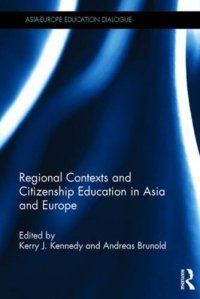
Ebook: Regional Contexts and Citizenship Education in Asia and Europe
Author: Kerry J. Kennedy Andreas Brunold
- Tags: Reference Almanacs Yearbooks Atlases Maps Careers Catalogs Directories Consumer Guides Dictionaries Thesauruses Encyclopedias Subject English as a Second Language Etiquette Foreign Study Genealogy Quotations Survival Emergency Preparedness Test Preparation Words Grammar Writing Research Publishing Asian International World Politics Government Social Sciences European Civics Citizenship Specific Topics Reform Policy Education Theory Schools Teaching Administration Counseling Curriculum Instructio
- Series: Asia-Europe Education Dialogue
- Year: 2015
- Publisher: Routledge
- Language: English
- pdf
This book is concerned with the social and political aspects of regional groupings, particularly how citizenship education fares in regional contexts. The European Union (EU) has revolutionised its political and economic aims into more encompassing social and political goals. The Association of Southeast Asian Nations (ASEAN), on the other hand, is still moving towards fuller integration in social and economic terms as South East Asian nations seek a greater role on the global stage and particularly in the global economy. Both the EU and ASEAN have drawn up educational frameworks that collectively work to harness educational achievements which in turn work to fulfill social and economic objectives at the regional level. This book portrays citizenship issues affecting the two regions and describes the way citizenship education can reflect and address these issues. Case studies on EU and ASEAN member countries make up the book’s two parts which analyse, among other issues:
- The Changing Landscape of Citizenship Education in England
- Political Didactics and Political Education in Germany
- Rethinking a Conceptual Framework for Citizenship Education in ASEAN Countries
- Education for ASEANness: A tool to build an ASEAN community
This book explores new ideas on citizenship and comparative education in regional contexts and will be of interest to researchers concerned with the impact of regionalism on social development and to citizenship educators studying the influence of contexts on the construction of citizenship education.